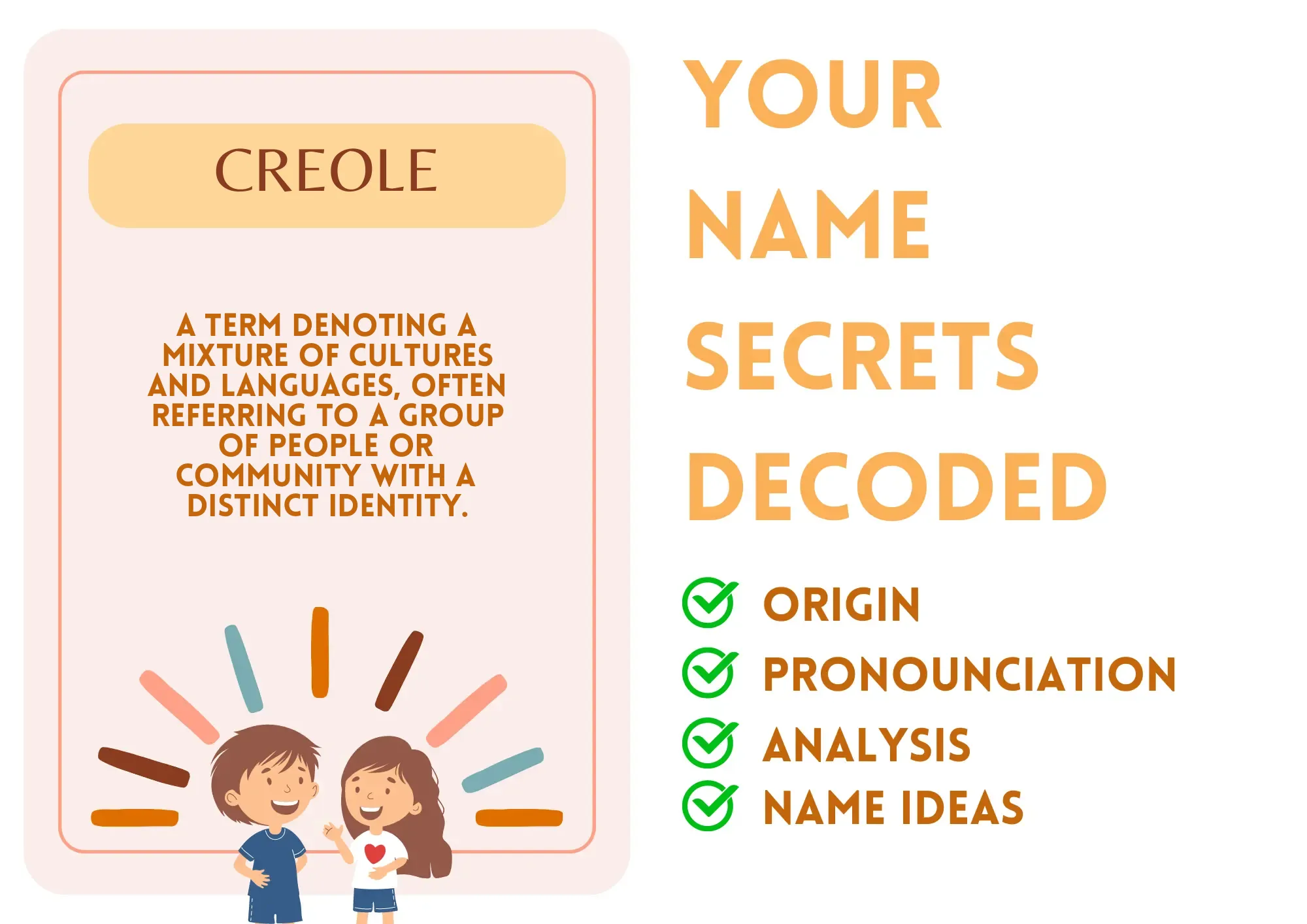
Creole
Creole is a name deeply rooted in cultural significance, representing a mix of linguistic and cultural heritages. It is often associated with communities that have emerged in various parts of the world, notably in the Caribbean and Louisiana. The term 'Creole' originally referred to the descendants of European colonists in the Americas, as well as the complex linguistic blends arising from colonization and migration. Therefore, the name carries connotations of diversity, resilience, and adaptation.
As a name, Creole can represent a rich tapestry of culture, identity, and community. It can be used for any gender, highlighting its versatility. The name has seen usage in literary and artistic contexts, representing the fusion of different elements into a cohesive whole.
Basic Information
Gender: Unisex
Sounds Like: KREE-oh-l
Pronunciation Explanation: The name is pronounced with the emphasis on the first syllable 'KREE', followed by a softer 'oh' and a lightly pronounced 'l'.
Summary and Meaning
Meaning: A term denoting a mixture of cultures and languages, often referring to a group of people or community with a distinct identity.
Origin: The name Creole has origins that stretch back to the colonial era, particularly associated with Latin America and the Caribbean.
Usage: Creole can be used for any gender, making it a flexible name choice that captures a variety of identities.
Name Number (Chaldean)
Name Number (Pythagorean)
Popularity (Global Rank)
Overall: 190173
Boys:
Girls: 77177
Most Popular in
Religious and Cultural Significance
Religion: Varied
Background: The religious affiliations of Creole communities vary greatly, reflecting the diverse backgrounds that contribute to their identity.
Cultural Significance: Creole culture is significant in several areas, particularly in music, cuisine, literature, and language, blending influences primarily from African, European, and indigenous sources.
Historical Significance: Historically, the term 'Creole' has been important in discussions about race, ethnicity, and language. It signifies a unique cultural synthesis formed through colonization, migration, and intercultural interactions.
Popular Culture
Literature and Mythology: The term is often used in literature to explore themes of identity, belonging, and cultural fusion.
Movies and Television: Characters and stories often labeled 'Creole' are featured in films and shows that highlight cultural heritage, such as the Louisiana variant in the animated film 'The Princess and the Frog'.
Feelings and Perceptions
Perception: Creole is often perceived positively; it evokes a sense of cultural richness, diversity, and community. However, some may associate it primarily with specific regional identities.
Positive Feelings: Culturally rich, diverse, unique, resilient, adaptive.
Negative Feelings: Might be seen as too niche or unfamiliar to some audiences.
Practical Considerations
Ease of Writing and Calling: The name Creole is easy to write and pronounce, consisting of six letters and two syllables, making it memorable and accessible.
Common Typos and Misspellings: Creolee,Creol,Creeole,Creool
Common Nicknames: Cree,Ro,Cree-Cree
Creole Popularity
Creole Usage and Popularity By Country
| Country | Rank (Overall) |
|---|---|
| Seychelles | 1668 |
| Mauritius | 11651 |
| Cameroon | 16801 |
| New Zealand | 33723 |
| Argentina | 34935 |
| United Arab Emirates | 67985 |
| France | 72677 |
| Canada | 74425 |
| United States | 77571 |
| United Kingdom | 90588 |
Creole Usage and Popularity By City
| City | Rank (Overall) |
|---|
Compatibility Analysis
Famous Persons Named Creole
No results found for Creole.
Related Names
Similar Sounding Names:
Cleo,Keira,Crayol